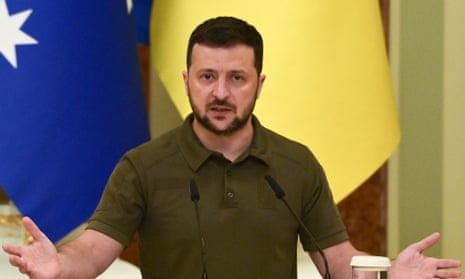Ukraine’s richest people, known in the country as oligarchs, are used to dominating political and economic life. But in the five months since Russia’s full-scale invasion started, they have gone quiet.
Political analysts and experts attribute this loss of influence to the fact that oligarchs and their businesses – like all Ukrainian citizens – need protection in the form of the military and diplomacy, state functions they have no control over.
Mykyta Poturyaev, an MP and former election campaign adviser to several Ukrainian oligarchs and politicians including the president, Volodymyr Zelenskiy, said oligarchs are in the unusual position of not being able to influence the country at the moment.
“Unlike in 2014, when [Ukrainian oligarch Ihor] Kolomoisky, for instance, was involved in defending Dnipropetrovsk region, there is someone to do that now – the state, the regional administration,” Poturyaev said.
The war has seemingly enabled Zelenskiy to become the first Ukrainian president to sideline the oligarchs, who have traditionally competed to control the country’s political leadership.
But analysts say that only once the war is over will it be clear if Ukraine’s oligarchic era has ended or if the oligarchs will try to regain their influence.
“Right now, the priority for oligarchs is not politics but ensuring the survival of their businesses and minimising their losses,” said Volodymyr Fesenko, a Ukrainian political analyst. “The only exception is [Ukraine’s previous president Petro] Poroshenko, who is still trying to be involved in politics,” said Fesenko.
When the Soviet Union dissolved, a sliver of Ukraine’s population made serious money by taking over former state factories and businesses, sometimes by force. Some of those individuals used their gains to bribe senior officials, including successive Ukrainian presidents, and created political parties and media holdings in order to protect and expand their businesses.
The aim was to make sure people in power were under their control. Ukrainian presidents, in turn, tended to create their own powerhouse to protect their interests. Ukrainian politics became a carousel of intrigue, infighting and corrupt backroom deals, primarily driven by personal interests. Often only lip service was paid to the needs of ordinary citizens.
The EU and the International Monetary Fund has long pushed Ukraine to clean up its oligarchic system, and in September 2021, Zelenskiy passed a de-oligarchisation law that, among other things, created a register of oligarchs.
Under the law, oligarchs are defined as people who meet any three of four characteristics: participation in political life, significant influence on the media, owner of a monopoly, or owner of assets worth more than 1m times the Ukrainian living wage.
“The law on de-oligarchisation can play a role in reducing the harmful influence of private interests on the politics and economy of Ukraine,” wrote the British ambassador to Ukraine, Melinda Simmons, at the time.
Rinat Akhmetov, who rejects the label oligarch, handed over his large media holding to the Ukrainian state last week when the law came into effect, according to a statement on his holding’s website. He said he did it because he did not want to “become an oligarch” by being included in the register. Zelenskiy’s adviser, Mykhailo Podolyak, said Akhmetov was leading by example.
Analysts say another likely reason is because Akhmetov’s businesses are experiencing cash-flow problems caused by the war. “The [oligarchs] also lost influence because their businesses have lost a lot,” said Poturyaev.
Almost all of Ukraine’s oligarchs have made statements against Russian aggression and have given funds to the army and for humanitarian aid in a show of unity that may have been prompted by a meeting Zelenskiy called before the war, the FT reported.
Even Dmytro Firtash, an oligarch who is resisting US extradition in Vienna and who earned his billions as a middleman for Gazprom, has said he wants to return to Ukraine to help. Firtash owns several fertiliser plants in Ukraine, including one in the eastern city of Severodonetsk, which was bombed in June.
The oligarchs are not the only part of Ukraine’s political scene that has gone quiet. Ukrainian MPs and faction leaders appear to have come to some sort of informal agreement to present a unified front while Russia’s aggression continues, said Fesenko.
“Political life is half frozen,” said Fesenko. “Normally, when someone like the general prosecutor is fired, the party faction leaders would make statements and politicians would give comments. A couple of MPs did, but most restrained themselves,” he said, referring to the dismissal this of Iryna Venediktova.
Ukraine’s MPs have been voting, sometimes almost unanimously, to pass pieces of legislation, including big sticking points such as the Istanbul convention on domestic abuse. It has been a marked change to before the war when Ukrainian parliamentary sessions were famous for brawls and fist fights.
It remains to be seen if new political dynamic will remain.
“We can only know after the war if the [oligarchs] will attempt to regain their influence,” said Fesenko. “It will depend on what is happening.”
If Ukraine wins the war by dealing a decisive military blow to Russia, then Zelenskiy’s popularity will remain high, said Fesenko. However, if Zelenskiy is forced to agree to a ceasefire compromise, for instance, to shore up the rest of the country, then it will divide society and an opposition will appear, he added.
